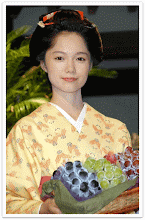As we have been working on publishing
an illustrated a book and a epic Samurai Novel, we haven't had the
time to review any films lately and we do apologize for that. So in
doing so we thought this film review was worthy of mention. Earlier
this year we reviewed the 2012 film “Emperor” which depicted the
American Occupiers post war investigation as to the Showa Emperor's
role in the war. In our research we discovered an earlier Russian
film which also depicted the late Showa Emperor in the same period of the closing days of WWII in the 2005 film titled
“The Sun” directed by Aleksandr Sokurov'. While Sokurov' contends
he is not interested in Politics, the stark difference between
Emperor and The Sun become quite clear.
The Sun features Ogata Issei in the
starring role as the Showa Emperor Hirohito. In this film we see a
very different Showa Emperor cloistered in the isolation and
claustrophobia of his underground wartime bunker. While conditions
inside the Imperial Bunker are not so much like the Führerbunker
in Berlin, the mood is equally grim.
Here we see a rather frail looking
Showa Emperor meeting with his wartime Ministers in Military uniform
for the last time. As depicted in other films, ministers
representing the rival Army and Navy bicker over who has lost the
war. The Emperor seems powerless to control the ensuing debacle and
escapes his air raid shelter to study marine biology as a mental health distraction
while Tokyo is under constant bombardment. Unlike Hitler, the Showa
Emperor is portrayed as being somewhat childlike and lost consuming himself in Tanka poems of his grandfather the Late Meiji Emperor and other philosophical pursuits. While he does accept personal blame, he does acknowledge his own limited power to stop his ministers from going to war and the arrogance that in turn lost the war.
While it is anyone's guess here in the
West as to how he the late Hirohito felt about his divinity, The Sun
depicts his divine status as a burden which he is happy to be rid of.
History recalls this was an imposed condition of Japan's
Capitulation. As the film continues on, we have no visible time line
between the closing days of the war and the post war Occupation. In
fact, you can never tell when this film is going to become dramatic
or going to end. One moment, air raid sirens scream in the background
while we are given an artsy depiction of angry fish replacing enemy
bombers incinerating the capitol.
The next thing you know there are
American soldiers on the Imperial Palace Grounds treating the IHA
staff and the Emperor himself with a total lack of respect. Save for
one Nisei Warrant Officer (played by Georgi Pitskhelauri ) who serves
as MacArthur's translator who bows and addresses the Emperor with
dignity, the rest of the troops mock the Japanese. While it is likely
possible that such disrespect may have taken place during the
American Occupation, it's hard to imagine seeing the Showa Emperor
being taunted by common American foot soldiers from Alabama during a
photo session being called Charlie Chan.
Straying further from history, there is
no mention of General Bonner Fellers who in Emperor leads the
investigation into the Emperor's Wartime Role. In “The Sun” we
have General MacArthur (played by Robert Dawson) leading the
investigation himself in a series of personal meetings where he
grills the Emperor in an antagonistic manner in English and somewhat with contempt. We of course had a problem with this. Whatever MacArthur's private notions might have been, he is recorded as treating the late Showa Emperor with dignity and respect not found in this film. Sorry Robert Dawson, but Tommy Lee Jones played the role with more character.
History
recalls that MacArthur did meet with him eleven times and did so as
respect as he saw him as a living unifying symbol of Japan. In
contrast, the film depicts the Showa Emperor as a frail, nervous, and
somewhat lost in his own sense of dimension. Clearly, if there was
some truth to it the Imperial Household Agency would have objected to
letting the public see this private side that robbed the late Emperor
of his dignity. An actor can only work with the script given to him.
And while we can not blame Ogata for the role we can question the
writing of this picture. For our money, we recommend you pass on this
film and see Emperor.
If you would like to see The Sun for yourself, it is available on Netflix for rental.




























No comments:
Post a Comment